On Monday September 5, at 12:52 local time, a strong earthquake struck southwestern China’s Sichuan Province. The 6.8-magnitude earthquake jolted Luding County, Ganzi Tibetan Autonomous Prefecture, and killed at least 88 people.
The tremor could be felt miles away from the epicenter, including in the provincial capital Chengdu, which is about 220 kilometers from Luding. The earthquake injured more than 270 people, while 30 persons are still missing.
As many netizens shared videos of how they experienced the earthquake, dozens of hashtags went trending on Chinese social media relating to the earthquake and its aftermath, including the 2.9 magnitude aftershock Luding experienced on Wednesday.
There were many stories shared on Weibo relating to the extensive damage and devastation caused by the earthquake. But besides the solidarity statements expressed online, there was also criticism coming from netizens about local authorities prioritising the battle against Covid-19 at such a critical moment.
Sharing Stories of Compassion and Camaraderie after Earthquake
Bad times sometimes bring out the best in people, and this was shown in the many stories circulating online this week.
The 56-year-old Ms. Gao, who runs a local chicken noodle soup restaurant in the town of Moxi in Luding county, was not at her restaurant when the earthquake hit. But she soon rushed to the disaster area and used all she had left to provide free soup and noodles to local residents and rescue workers, even though Gao, who suffers from breast cancer, is struggling herself (#患癌女子用仅剩一罐气为震区居民做汤面#).
Another Luding country resident, a local farmer named Chen, reportedly spent 12,000 yuan ($1730) out of his own pocket to buy and butcher three giant pigs in order to provide the local residents and fire fighters with roast pork. Chen’s brother additionally donated 1000 kilos of rice so that people in the disaster zone could have some warm meals (#四川兄弟给震区捐3头猪2000斤米#).
On September 9, one Chinese TV reporter who was working in the disaster zone rescued a young child who was separated from his parents during the chaos. Videos showed how the reporter, determined to find the child’s parents, prioritized the child over his work. The little boy was eventually reunited with his mother, who had not slept for 48 hours (#记者受人之托紧抱孩子不撒手#).
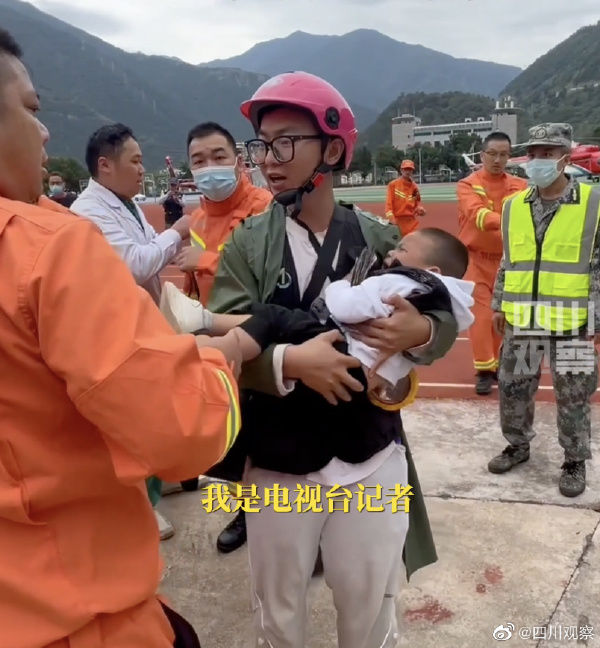
Chinese TV reporter deterined to reunite this child with its mother.
These kind gestures and efforts were much needed for those dealing with grief and loss after the earthquake. One man in Luding smiled when a reporter approached him, but he broke down in tears the moment he started talking about losing his sister in the earthquake (#大哥微笑接受采访一开口泪崩了#).
Chinese media outlet Fengmian reported that the 26-year-old rescue worker Qin Xiaoqiang (秦晓强) worked around the clock to rescue and dig out three people who were trapped under the rubble. Afterward, he learned that his own father and sister were killed in the earthquake (#痛失家人特警说要让更多家庭团圆#).
Some families lost all they had in the earthquake. On Weibo, many people donated to various earthquake-related causes via the Weibo Public Good platform (微公益).
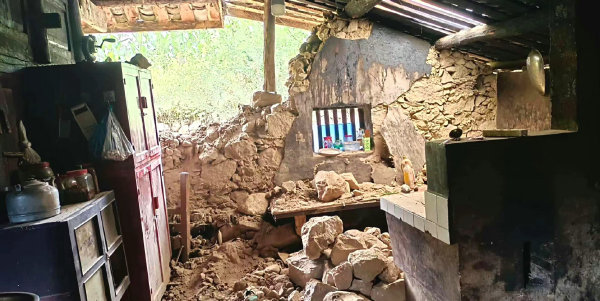
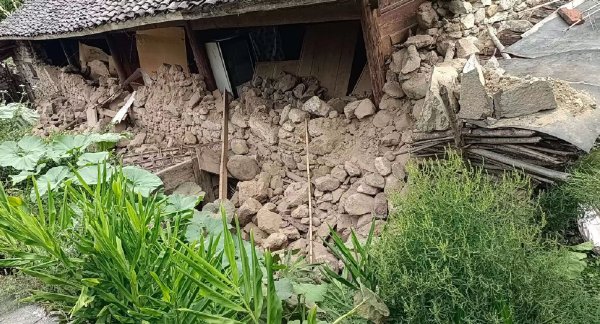
Besides the aid charities raising funds thanks to Weibo and Wechat users, there are also dozens of Chinese celebrities who stepped up and donated money to help rescue work in the region. Among them were Chinese actor Leo Wu (Wu Lei, 吴磊) and Chinese actress Rosy (Zhao Lusi, 赵露思) – both made headlines for their contributions to the rescue operation (#吴磊为四川震区捐赠物资#, #赵露思向四川泸定捐赠物资#).
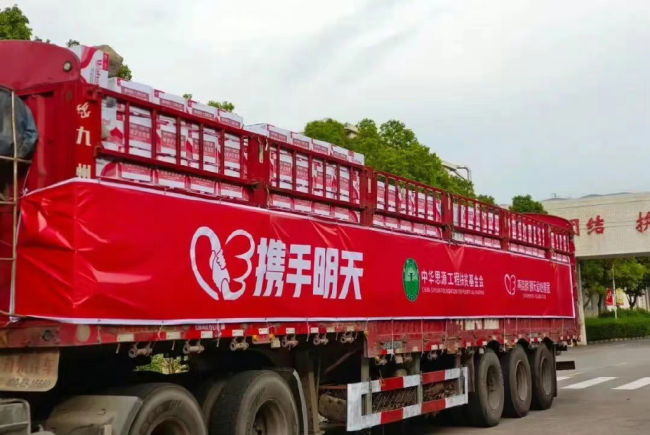
There were also other celebrities, including names such as Zhang Tian’ai and Wang Yibo, who donated money to help fund five Sichuan rescue teams to go to the front lines and to transport basic necessities to Luding County and other affected regions (#王一博为四川震区捐赠物资#).
Official Media Accounts Highlight Compassionate & Courageous Rescue Efforts
Over the past week, Chinese official state media outlets such as People’s Daily, Xinhua, and CCTV published countless posts on Weibo relating to the earthquake. In covering the earthquake on social media, Chinese state media have a clear human interest angle and make a strong appeal to emotion as many of these posts specifically focus on the rescue and relief efforts and the bravery, compassion, and humanity shown by Chinese rescue workers (#消防武警民兵公安奔赴震区救援#).
On September 8, People’s Daily highlighted the moment an armed officer evacuated a baby from the disaster zone, the small child calmy drinking their milk while safely strapped on the soldier’s back (#震区宝宝在武警背上乖乖喝奶#).

People’s Daily also reported about several firefighters carrying an old lady and getting her out of the earthquake zone.
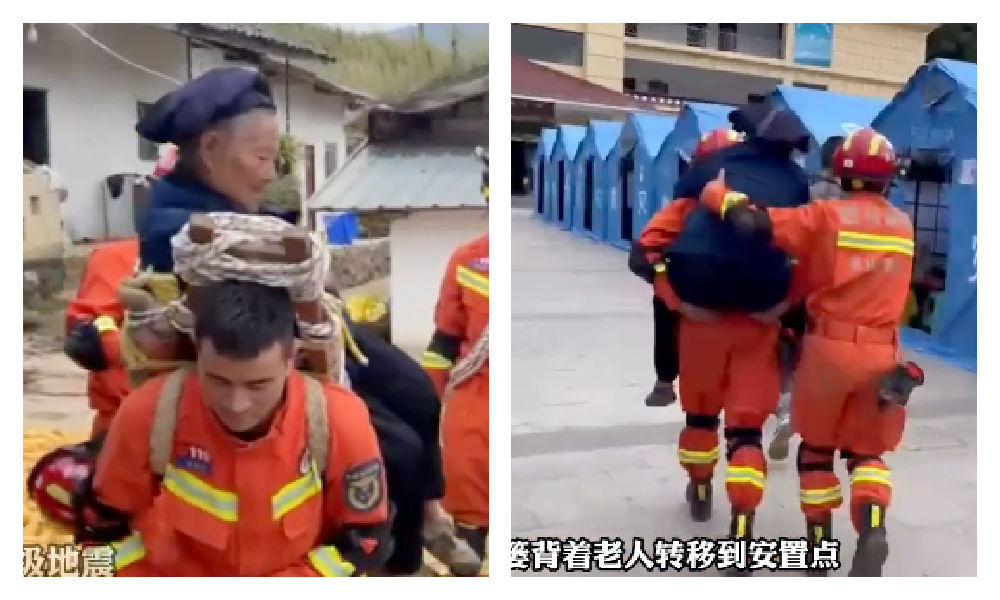
Global Times published a story and video about a firefighter whose feet were completely blistered and battered after working in the earthquake-hit zones (#震区消防员脚底被磨破#).
Official media published various propaganda posters showing emergency workers, including firefighters, paramedics, and police officers, during the rescue operations. One poster compared the ongoing relief efforts in Luding to those during the 2008 Great Sichuan earthquake or Wenchuan earthquake, during which a devastating 69,000 people lost their lives.
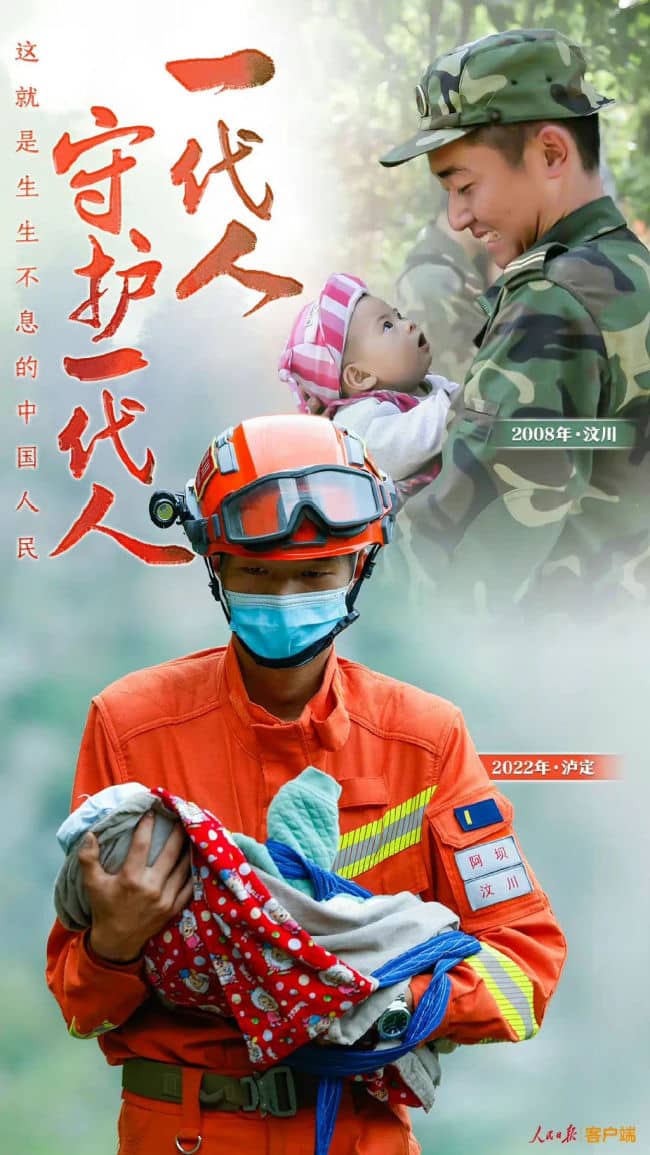
The China Fire and Rescue account shared a “Pray for Luding” poster on Weibo showing emergency workers carrying a special rescue stretcher with the help of volunteers. The hashtag “Pray for Luding” (#为泸定祈福#) received over 280 million clicks within four days time.
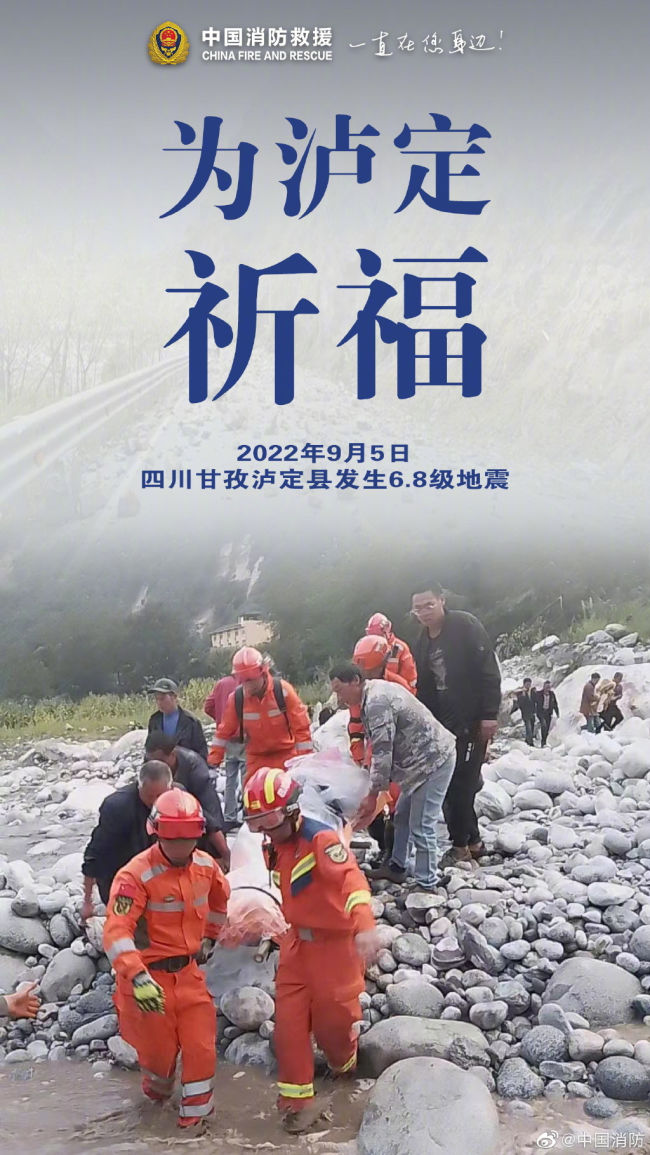
State media outlet Xinhua emphasized the bravery shown by young workers operating excavators on dangerously steep hills to clear roads of debris (#震区绝壁上的挖掘机手是90后# and #泸定地震中打通生命通道的孤勇者#).
The story of a team of 24 rescue workers who got stranded in the Hailuogou Scenic Area near Moxi Town also was covered a lot; the rescue workers were at the scene shortly after the earthquake hit but then were unable to get back to due to changing weather conditions. Their safe return was celebrated by various Chinese state media on September 10 (#24名滞留震区孤岛特警全部平安#).
Online Grassroots Criticism on Prioritizing Anti-Epidemic Efforts
But amid all the online stories and Chinese media narratives focusing on courage, compassion, and camaraderie, there was also criticism, as the strong earthquake put things into perspective regarding China’s ongoing fight against COVID-19 and the zero-Covid policy.
After local health authorities in the disaster area announced a strengthening of epidemic prevention and control measures on September 7, including daily nucleic acid testing for rescue workers and a stop on volunteer rescue workers coming into the area, many people showed little understanding.
“The earthquake is not as important as epidemic prevention,” some wrote.
“People’s lives are at stake and we’re still all about epidemic prevention. The earthquake [apparently] is not as powerful as the ‘big flu’ – it’s really hopeless.”
“Trivia. During the few years of epidemic in Sichuan, a total of three people died. During a few minutes of the earthquake, more than 70 died.” “By now, the mortality rate of this virus is less than the flu,” one person responded.
“The epidemic prevention comes first, people’s lives come second,” others wrote. “What happened to ‘putting people and life first?'” some wondered, mentioning the famous quote by Xi Jinping.

One Weibo user posted a photo of a dog getting tested for Covid, writing: “[China’s] major nucleic acid testing companies allegedly made $16 billion in the first half of this year, so it’s certainly wouldn’t be excessive if they donated some money to the earthquake area, right?”
By Manya Koetse
Get the story behind the hashtag. Subscribe to What’s on Weibo here to receive our weekly newsletter and get access to our latest articles:
Spotted a mistake or want to add something? Please let us know in comments below or email us. First-time commenters, please be patient – we will have to manually approve your comment before it appears.
©2022 Whatsonweibo. All rights reserved. Do not reproduce our content without permission – you can contact us at info@whatsonweibo.com.
The post Courage, Camaraderie, and Criticism: The 2022 Sichuan Earthquake on Chinese Social Media appeared first on What's on Weibo.